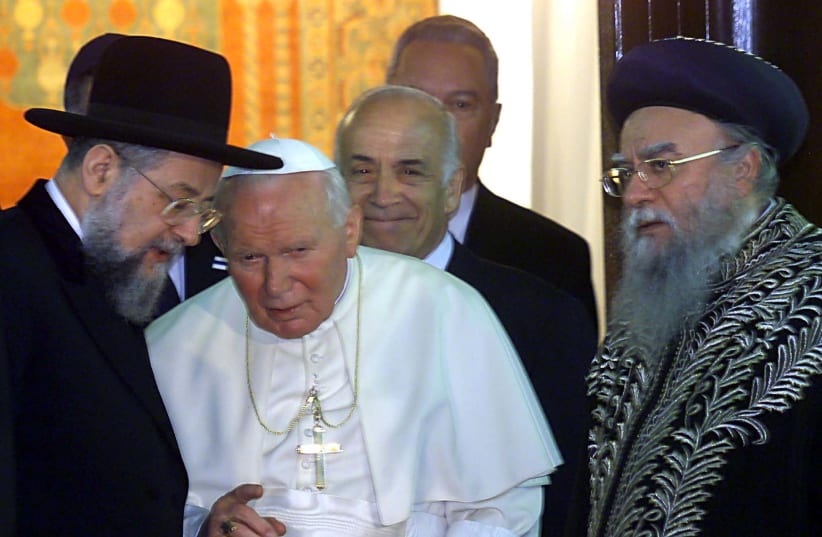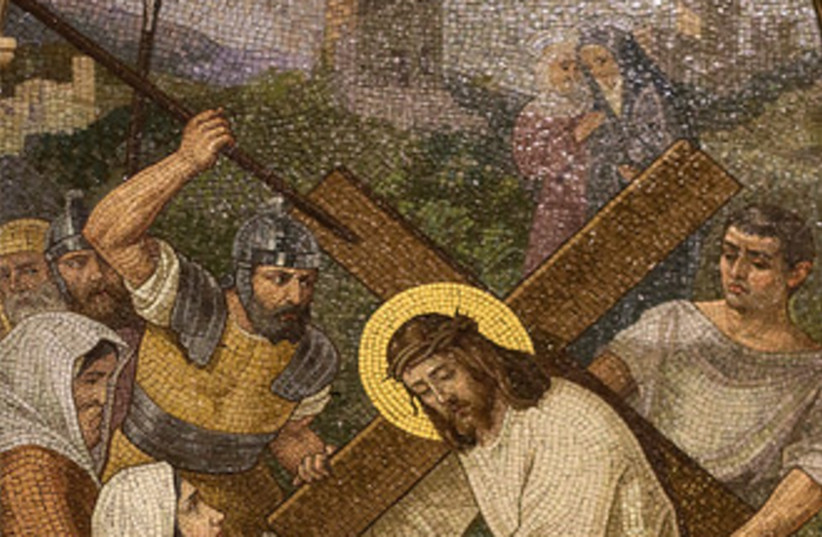In the fourth paragraph of the Second Vatican Council’s declaration, Nostra Aetate (1965), the Catholic Church deplored “the hatred, persecutions and displays of anti-Semitism directed against the Jews at any time and by anyone”; emphasized the common heritage of Christians and Jews; and called for interfaith dialogue, mutual understanding and respect.
Nevertheless, Karma Ben-Johanan points out, Vatican II did not address the fundamental theological implications of Nostra Aetate. If Jews were rejected by God and replaced by the Catholic Church until the end of history, did they not need to accept Christ as their savior to achieve salvation? What does Jewish survival, their covenant with God, and the establishment of the State of Israel, mean?
In Jacob’s Younger Brother, Ben-Johanan, a professor of Jewish-Christian Relations at Humboldt University at Berlin, provides an extraordinarily sophisticated, insightful and provocative examination of how Roman Catholics and Orthodox Jews addressed the prospect of reconciliation in the second half of the twentieth century. As she “extracts dominant trajectories out of a vast mixture of diverse phenomenon,” Ben-Johanan argues that the secular, liberal post-World War II order that facilitated Christian-Jewish dialogue pushed the Church to offer the faithful “a sense of belonging and an anchor of identity in this world more than salvation in the next.” And it empowered Orthodox Jews to highlight their profound differences with the Church, but also see secularization “as a joint enemy that unites them with their Christian counterparts.”
A catalyst to reexamine fundamental Christian dogmas
For a few progressive post-Vatican II Catholics, Ben-Johanan reveals, the turn to Judaism was a catalyst for a reexamination of fundamental Christian dogmas. If Jesus really was a man of first-century Jewish Palestine, Hans Küng asked, was he “More than a prophet? More than the law? Is he even the Messiah? A Messiah crucified in the name of the law?”
Catholics across the theological spectrum acknowledged that the Holocaust undermined the conviction that Jews’ rejection of Christ doomed them to eternal damnation because the appalling punishment “vilified God’s morality.” Albeit in different ways, however, they gravitated toward claims that Jews were distant from God by their own choice, but close to God by His choice. And, Ben-Johanan writes, to affirm that post-crucifixion Jews had a positive role in salvation “but keep that role a mystery.”
As if to underscore the challenge, while Jews deemed comparisons between the crucifixion and Auschwitz abhorrent, because genocide in gas chambers was neither voluntary nor in any sense redemptive, Christians found the comparisons almost self-evident “and too valuable to completely relinquish.”
The existence of Israel forced Catholic thinkers to decide whether the Jewish state was a secular event or a stage in the Christian program of salvation. Most of them, we learn, vacillated between discomfort at the messianic interpretation Orthodox Jews gave the State of Israel and the sense that recent events fit well into their own messianic narrative.
AS THEOLOGICAL disputes threatened to sabotage Vatican II and undermine Catholic doctrines, John Paul II transformed discussions of the Catholic-Jewish relationship. The Pope endorsed conservative positions inside the Church but communicated with the outside world “with acts and gestures, personal meetings, diplomatic contacts, and the creation of shared memories,” including highly publicized visits to Auschwitz and the Yad Vashem Holocaust Museum in Jerusalem.
By the end of his pontificate in 2005, Ben-Johanan notes, the once traumatic and still unresolved controversies interested only a handful of Catholic theologians. Efforts by Benedict XVI to provide more precise answers “came too late, after the sun of theology had already set.”
According to Ben-Johanan, contemporary Orthodox rabbis, Zionist and anti-Zionist, in Israel and the United States, perceive Christianity as idolatry, and reject “more tolerant” halachic traditions, despite their long history. She attributes the mainstreaming of more stringent positions less to a defensive response to secularization than to a conviction that Jews need no longer fear Christianity.
At a time in which many Christians and Jews renounced deicide charges, Zvi Yehuda Kook quoted Maimonides’ statement that Jesus had been stoned and hanged in a rabbinic court – and endorsed his defense of the murder of idolatry. The real crime, Kook declared, was expressed “in its disgusting loathsomeness, in the raising of ‘that personality’ as if it were divine, as if it were essentially equal related obscurely, foggily affiliated with the original and real selfhood of the Creator and leader of the universe.”
Continuing to see exile as a temporary phase, the Kooks and their disciples could now exult “that the lion cub of Judea has been resurrected and established its state, and the resurrection in its own right undermines the entire foundation of Christian faith.” The Six-Day War, they proclaimed, vindicated biblical prophecy and the validity of the covenant between the people of Israel and God.
At the dawn of the 21st century, Ben-Johanan concludes, the Catholic Church no longer threatens eternal damnation, rarely made the claim that the church is the true Israel, or that God’s covenant with the Jews had been withdrawn. Nor has the church specified “the theological meaning in these changes in the Christian worldview.”
While the church is searching for ways to rehabilitate itself, Orthodox Judaism, “wishing to rid itself of the sanctification of weakness,” has harnessed itself “to the impossible project of cleansing from its sources all traces of relations with Christianity in a search for a pure and primordial form of Judaism.”
Jacob’s Younger Brother ends, however, with Ben-Johanan’s search for a silver lining. The dynamic of “Christian embrace met by Jewish pushback,” she declares, does not imply stagnation. Each religious community is “updating its tradition and extracting new principles,” appropriate for its reading of signs of the times.
Ben-Johanan hopes that more Christians will recognize that the “reconciliation that brings an end to the old relationship, with all of its problems, is in itself… suffused with anti-Jewish elements.” And she seems pleased that the reconciliation with “inherent tensions between the Jewish and Christian traditions” is holding.
The writer is the Thomas and Dorothy Litwin Professor of American Studies at Cornell University.
Jacob’s Younger BrotherBy Karma Ben-JohananHarvard University Press356 pages; $35

